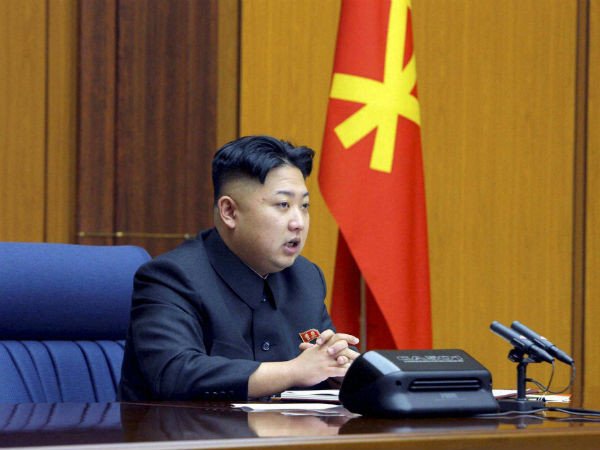Kim Jong-un Becomes First North Korean Leader to Set Foot in South Korea
Kim Jong-un has become the first North Korean leader to set foot in South Korea since the end of the Korean War in 1953.
In a moment rich with symbolism and pomp, South Korean President Moon Jae-in and Kim Jong-un shook hands at the border.
Kim Jong-un said it was the “starting point” for peace, after crossing the military line that divides the peninsula. He also pledged a “new history” in relations with his neighbor.
His visit comes just months after warlike rhetoric from North Korea.
Much of what the summit will focus on has been agreed in advance, but many analysts remain skeptical about North Korea’s apparent enthusiasm for engagement.
Kim Jong-un and Moon Jae-in were met on April 27 by an honor guard in traditional costume on the South Korean side. The leaders walked to the Peace House in Panmunjom, a military compound in the demilitarized zone (DMZ) between the two countries.
The North Korean leader then invited the South Korean president to step briefly across the demarcation line into North Korea, before the pair stepped back into South Korea – all the while holding hands.
CIA Director Mike Pompeo Had Secret Meeting with Kim Jong-un in North Korea
North Korea: Kim Jong-un Hosting Dinner for Two South Korean Delegates
It was an apparently unscripted moment during a highly choreographed sequence of events.
When the first session ended, the pair separated for lunch and Kim Jong-un returned to North Korea in a heavily guarded black limousine.
When he returned in the afternoon, the leaders took part in a ceremony consisting of the planting of a pine tree using soil and water from both countries.
Kim Jong-un and Moon Jae-in shoveled soil on the roots of the tree and unveiled a stone marker featuring their names, official titles and a message that read: “Planting peace and prosperity.”
The Korean summit will conclude with the leaders signing an agreement and delivering a joint statement before dinner. The banquet will be held on South Korea’s side and the menu is as symbolic as the other rituals.
According to local sources, Kim Jong-un will serve Swiss potato dish rosti – a nod to his time studying in Switzerland – along with North Korea’s signature dish of cold noodles, and North Korean liquor.
Kim Jong-un is accompanied by nine officials, including his powerful and influential sister Kim Yo-jong.
The Korean meeting – the first between Korean leaders in more than a decade – is seen as a step toward possible peace on the peninsula and marks the first summit of its kind for Kim Jong-un.
The summit carries promise for both Koreas with topics being discussed ranging from nuclear technology and sanctions to separated families, and is seen as an opportunity to foster economic co-operation.
Ahead of talks with President Moon at the Peace House in the border village of Panmunjom, Kim Jong-un said: “I feel that [we] have fired a flare at the starting point… the moment of writing a new history vis-à-vis peace, prosperity and North-South relations.”
He also wrote in a guestbook: “A new history begins now.”
The White House has expressed hope that the talks will achieve progress towards peace ahead a proposed meeting between Kim Jong-un and President Donald Trump in the coming weeks – an unprecedented move.
Talks are likely to focus on reaching an agreement on North Korea’s nuclear weapons program, which has advanced significantly since the last summit more than a decade ago.
South Korea has warned that a deal to rid North Korea of its nuclear weapons will be “difficult” to achieve.
Kim Jong-un announced last week that he was suspending nuclear tests.
The move was welcomed by the US and South Korea, although Chinese experts have indicated that North Korea’s nuclear test may be unusable after a rock collapse following its last nuclear test.
As well as addressing North Korea’s nuclear ambitions, Kim Jong-un and Moon Jae-in are expected to discuss a formal end to the 1950-1953 Korean War, as well as economic and social issues.
